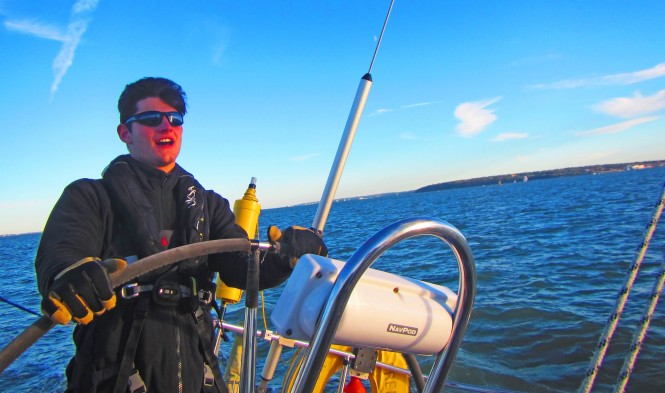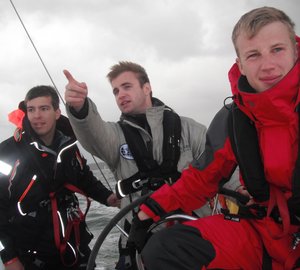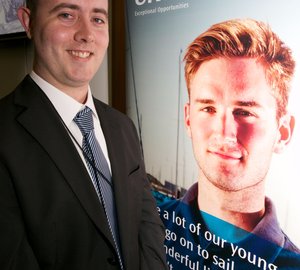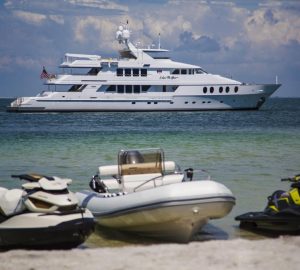Students leaving school, who are not able to secure or fund a place at conventional university, and young workers looking for an alternative career path, would do well to contemplate the highly professional and burgeoning international maritime sector.
Isle of Wight-based youth education charity UKSA still has 12 coveted bursaries left to allocate on its world-renowned four-year cadetship, which includes a Foundation Degree in Operational Yacht Science delivered in conjunction with Falmouth Marine School and validated by the University of Plymouth. Training begins in October and allows students to ‘earn whilst they learn’ and train for a well paid and exciting career on superyachts, which typically sell for over £100million.
These Yachting Cadetships for 18-25-year-olds are generously part funded by two of the leading UK maritime charities, which makes them accessible to everyone and an immediately viable option for those considering vocational training over the more traditional study or career paths.
Six of the bursaries are available via Trinity House and amount to £17,880 of assistance/funding (£3,000 is towards the Foundation Degree in Year 2 and the rest for the first phase of training at UKSA’s Isle of Wight campus). But hurry as you’ve only got until mid July to apply for these six!
Alternatively, another six are available from Seafarers UK, at £10,500 for the 5-month phase one training (£2,000 of which is from the *Milo Hanlon Bursary). You have until mid September to apply and be selected and priority will be given to those who display a clear welfare need and/or have a proven family connection to the maritime industry.
UKSA Cadetship Manager, Emma Baggett, explains: “With expensive tuition fees and graduate unemployment rates, vocational training has definitely become the new university – and ours is particularly in demand because of these bursaries on offer. Our yachting cadets can easily graduate debt-free because of what they earn during what amounts to some two years of paid work placements, plus food and accommodation is included in the cost of training. Once onboard a vessel almost all of the student’s living costs are covered by the yacht too.
“With the help of Trinity House and Seafarers UK, aspiring young captains can now take the first step into this unique career path, because the work placement phases – entry level professional deckhands can typically earn €2000 a month tax free (not including tips) working in locations across Europe (including the popular Mediterranean) and the Caribbean – are a proven means of funding the rest of the cadetship
“We currently have some 150 cadets at various stages of their training working in the industry and it’s our global relationships with crew agents and captains themselves that make the cadetship so successful. This support, which carries on throughout their careers, is unique to UKSA.
“The FdSc Foundation Degree was recently granted full-time status and can now be applied for through UCAS, plus successful 2014 cadets will be able to drawn down on student loans to assist them further – as well as taking advantage of all the other associated benefits that full-time students enjoy. Consequently, it’s become an internationally recognised qualification that will not only shape and reinforce a young crew’s career path, but also offer a transferable qualification for later life.”
Applicants should have obtained at least 120 UCAS points (or the equivalent in work experience) and have high grade passes in GCSE Maths and English. You must be seeking a genuine alternative to university and also demonstrate a keen desire for a long term career in the superyacht industry – and whilst previous water sports and/or yachting experience is highly desirable, it is not essential.
For further cadetship bursary details contact UKSA’s career advisors on 01983 203038, or email careers@uksa.org. For those not accepted onto their chosen bursary, there is the option of a Career Development Loan worth up to £10,000 – and the rest contributed by the student.
Other routes via a career development loan include the 23-week Professional Yachtmaster Ocean course (£14,995), which is basically the first two phases of the cadetship. This is increasingly proving popular with the older generation too, who have a spare six months through redundancy, early retirement or a lifelong desire to try something different, but can quickly recoup the costs via a profession that offers very well paid starter salaries.
UKSA’s six-week Crew Training for 18-25s is the most simple and cost effective way of gaining employment as a deckhand or crew on yachts of all sizes, including superyachts. It costs just £3,995 (you would spend the same on a basic plumbing course, stuck at home, in your local college) but once employed students can typically earn enough money in a year to fund the cadetship.
If you want to skipper your own yacht, work with charter and flotilla companies, carry out short haul deliveries, or teach yachting, then Professional Yachtmaster Offshore opens doors to the whole industry. This 13-week intensive course costs £7,250, is world renowned, and also attracts 25-30 year old manager types, looking for a career change, but entry at the appropriate level. As an example, those working on decent sized charter boats can generally live on tips alone and double a circa £30,000 per annum salary that could remain untouched in the bank.
For those more suited to working below deck, or attracted to glitz and glamour, UKSA’s Superyacht Interior Foundation course (just three weeks long and only £2,600) is a whistle stop tour of working in the uber rich and cool superyacht industry. It will equip you with all the hospitality and personal skills needed to excel in the playground of the seriously wealthy, together with the essential safety training required for work on board.
*Set up in honour of former Seafarers UK cadet Michael ‘Milo’ Hanlon who tragically died aged 22 whilst pursuing his superyacht dream in the South of France. It’s an interest-free loan and recipients simply agree a realistic and achievable repayment schedule, so the bursary continues to be available.


















